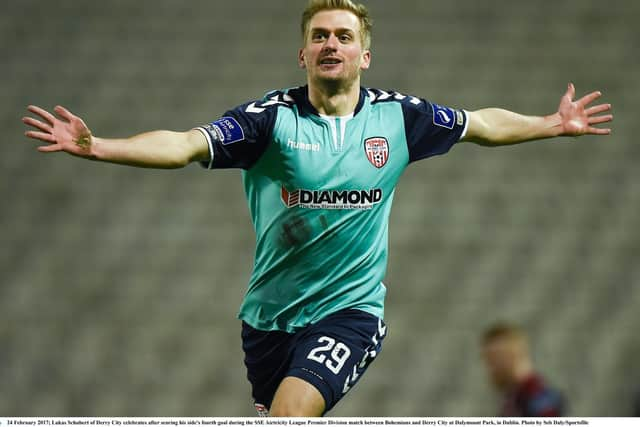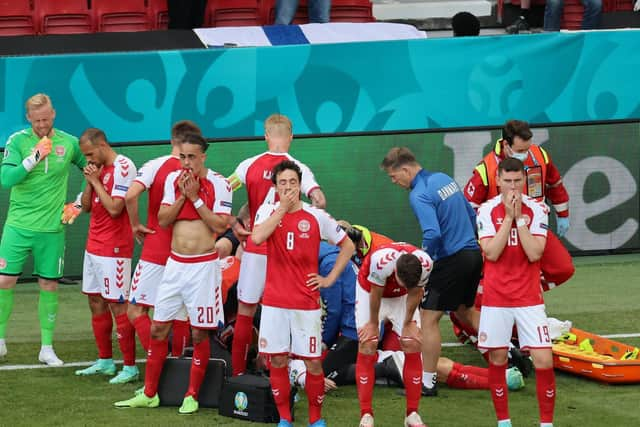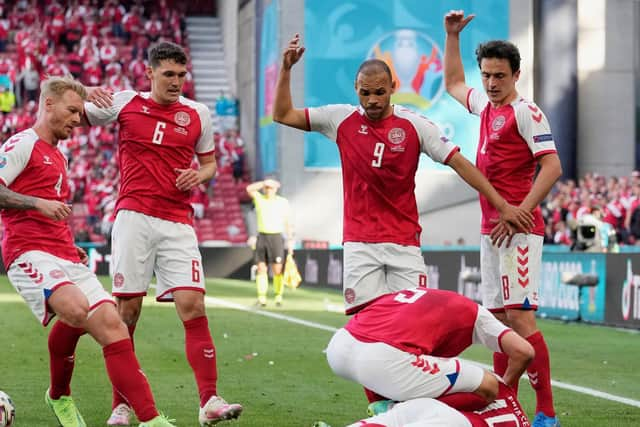Christian Eriksen's cardiac arrest triggers memories of life-changing heart battle for ex-Derry City winger Lukas Schubert
and live on Freeview channel 276
The former Derry City winger knew the tell-tale warning signs when the 29 year-old Inter Milan playmaker stumbled while running to collect a throw-in with no other player near him before laying seemingly lifeless on the pitch.
As medics rushed to perform chest impressions on Eriksen and used the pitchside defibrillator to ‘bring him back’, the 16,000 strong crowd in the Parken Stadium fell silent. Schubert too was speechless because those alarming scenes stirred up memories of the life-threatening heart condition which changed his own life and football career forever.
Advertisement
Hide AdAdvertisement
Hide AdOne of the most common causes of a cardiac arrest is severe heart rhythm abnormalities according to the British Heart Foundation. Other causes include cardiomyopathy - a disease of the heart muscle affecting its size, shape or thickness which can be inherited - and acute myocarditis or inflammation of the heart muscle.
The latter is the condition Austrian midfielder ‘Schubi’ was diagnosed with in 2013 while playing in the Austrian top flight with SV Grodig. His mother convinced him to go to the hospital to investigate pains in his chest, neck and back. It was a decision which resulted in two years out of football but one which saved his life.
Indeed, a similar condition caused the death of Hungarian striker Miklos Feher who passed away shortly after collapsing during a game for Benfica in 2004.
Eriksen’s globally televised cardiac arrest brought back memories of other high profile footballers whose lives or careers tragically ended due to heart complications. Former Bolton Wanderers midfielder, Fabrice Muamba collapsed during an FA Cup match in 2012, suffering a cardiac arrest, while ex-Liverpool and Swansea striker Besian Idrizaj tragically passed away in his sleep from a suspected heart attack in 2010.
Advertisement
Hide AdAdvertisement
Hide AdCameroon star Marc-Vivien Foe was another high profile casualty when he died from cardiac arrest during the 2003 FIFA Confederations Cup semi-final in France.


Now, in his role as an ambassador for the Heartbeat Foundation, ‘Schubi’ is hoping Eriksen’s horrific collapse and the quick, life-saving actions of the medical team help raise awareness of the necessity for all sports stadiums to be fully equipped with defibrillators.
Schubert was fortunate enough to get the chance to ‘live my dream again’ and is hoping the Eriksen incident can help avoid another tragedy in the sport.
“My immediate thoughts when I saw him losing co-ordination and falling down, I immediately thought, ‘Oh no!’”, recalled Schubert, “I thought it was a heart condition or a cardiac arrest. I immediately got goosebumps and was reminded of my own heart condition, Myocarditis.
Advertisement
Hide AdAdvertisement
Hide Ad“It was shocking for me but no comparison to his experience and what his family experienced in the stands, seeing their husband and father fighting for his life.”


Now enjoying life back home in Salzburg, Schubert is still playing in the Austrian fourth division and remains grateful for every moment on the football pitch.
Between September 2013 and August 2015 Schubert’s career had been put on hold at the age of 24 after suffering from inflammation of the heart muscle and he recalls the symptoms leading up to his diagnosis when he returned to training after contracting a virus.
“I had pain in my chest up to my neck and in my back,” he explained. “I didn’t have a cardiac arrest but my mother begged me to get it checked so I did.
Advertisement
Hide AdAdvertisement
Hide Ad“It came out that I had strong inflammation of the heart muscles so I’m thankful my mum told me to go to the hospital and the professionals that monitored me very closely. I was very lucky I did not collapse on the pitch.”


Despite having the best medical support, the most advanced GPS tracking devices and monitoring equipment at Inter Milan and with the Danish national team, Eriksen’s condition went unnoticed and the player went into the tournament seemingly in peak physical condition as the country’s star No. 10.
Schubert explains how it can happen to anyone at any time and stressed how fortunate the Dane was to suffer cardiac arrest in the national stadium where the chain of rescue was implemented so quickly before he was taken to the nearby hospital Rigshospitale, one of the Danish capital’s top cardiac units, where he continues his rehabilitation.
“It could have been a Miklos Feher or Marc-Vivien Foe or Besian Idrizaj, an Austrian who played for Liverpool, but the awareness must still be increased because the chain of rescue worked very well in Eriksen’s case.
Advertisement
Hide AdAdvertisement
Hide Ad“If this happens to him while alone in the kitchen or going for a walk, it’s over, he dies,” said Schubert bluntly. “It’s shocking but the place where it happened, in front of a full stadium with doctors and everything in place, he was lucky to get the condition in this environment.
“It can happen at any time,” he continued. “Something closes in the heart. I’m not a doctor but I’m sure he was monitored very well and it just can happen at any time. Your heart can stop beating, that’s why it’s so important there is a defibrillator in every stadium and the chain of rescue works because it saves lives.
“It doesn’t have to be a top footballer like Eriksen, it could be someone in the stands or a coach who gets a cardiac arrest and needs the defibrillator and everything working well.


“As stupid as it sounds, he was lucky. There is probably no better place where this can happen to you. I’m happy it has raised more awareness. It can also happen at a smaller club, maybe not at a Euros stadium where everything functions perfectly, so that’s important to raise awareness for everyone.”
Advertisement
Hide AdAdvertisement
Hide AdSchubert also believes the strain placed upon modern footballers, particularly the fixture congestion as a result of Covid-19, could, to some extent, contribute to the increasing prevalence of cardiac problems.
“I’m a big believer that the mental state and mental health is influencing the body. Footballers have so many games and careers end earlier and earlier. You always read about players’ careers ending when they’re 30 or 31 or even in their 20s and yet 10 years back it was usual to play until you were 38.
“But when you play a lot of games and there’s a lot of stress throughout the year, I think that also plays into the context.
“When I look at Germany’s Marco Reus, he pulled out of the Euros because he wants to spend some time with his family and wife after a long, hard season. But for me, that plays into why this is happening more often.”
Advertisement
Hide AdAdvertisement
Hide AdThe former Derry City fans’ favourite, who had helped Grodig win promotion to the Austrian top flight in the 2012-13 season, had played five of the club’s first 10 games the following season before his enforced lay-off after heart complications. His recovery period proved enlightening for the Austrian who now has a totally different outlook on life. And he insists he will be ‘forever grateful’ to Derry City and ex-City boss Kenny Shiels for ‘taking a risk’ on him in 2016 and providing a pathway back to professional football as he went on to make 51 appearances for the Candy Stripes.
“My condition was life-changing. I view life differently and appreciate time differently from a young man who hasn’t suffered a cardiac arrest or heart condition and I’m sure Christian Eriksen will see life differently as well after this.
“If you love something so much, like I love football, and you begin to feel better and better, at some point my body got rid of the virus that caused the inflammation and then I built my fitness back up. I trained with the under-16s and jumped in at a passing drill for two rounds and then stepped out again. I listened to my body very well.
“I went on trial with the New York Redbulls and then with Derry City. And Derry, and especially Kenny Shiels, took on the risk of signing me and I will forever be thankful to him. He gave me the chance to play professional football again. That’s also a reason why I gave everything for Derry City because Derry gave me the chance to live my dream again.”
Advertisement
Hide AdAdvertisement
Hide AdDerry goalkeeper Nathan Gartside is proof that heart conditions don't have to signal the end of a promising football career if it's diagnosed quickly, managed correctly and players 'listen to their body', according to Schubert.
Gartside was diagnosed with Myocarditis while at Watford in 2016, the same condition which put Schubert's career on hold three years previously.
The two players' paths never crossed as Schubert was beginning his short stay at Brandywell when Gartside was experiencing the start of a traumatic two years in London which threatened to end his dream of becoming a professional footballer.
That brush with mortality has given both men a fresh new outlook on life and on their careers and Schubert has encouraged young footballers not to ignore potential symptoms of cardiac arrest.
Advertisement
Hide AdAdvertisement
Hide Ad"If you do the right things and follow the right steps and listen to your body you can still play professionally," he insisted. "
"In my case it took two years to recover and I'm sure Christian Eriksen will need his time to recover. I don't see him playing in 2021 but if he wants to come back to the highest level, he's a footballer who can play at that level but it's up to him if he wants and up to the doctors to give him the clearance to get back to full fitness and play professional sports again.
“The way back is very difficult, but certainly possible. It just depends on whether Eriksen wants it too. I couldn’t imagine a life without football myself. I also wanted to prove to myself that I can do it again – but only with medical approval, of course.
"Like Nathan Gartside experienced, you can come back and it's the same for Christian Eriksen. Nothing is impossible if you really want it."
So what is his advice for young footballers?
Advertisement
Hide AdAdvertisement
Hide Ad"Get your yearly check-up of your cardiac system and clubs should make sure to have the defibrillator and everything in place and if you suffer the condition and if it's not your absolute destiny to die then you will be safe.
"There's a 70 or 80 per cent chance you will survive a cardiac arrest if everything is in order and people react quickly.
"So for the clubs it's important to have everything set up for an emergency like this. And that's what the Heartbeat Foundation is about. For every stadium and all sports, we want to make sure they are safe and everyone is prepared for an emergency like Eriksen's."
Schubert’s currently assistant coach with Red Bull Salzburg’s U13s and has taken his UEFA ‘B’ licence course as he looks towards a career in football when he eventually hangs up his boots. Expecting his first child this November with wife, Carina, he insists that connection with Derry remains strong and he had a special message for the Brandywell fans.
Advertisement
Hide AdAdvertisement
Hide Ad“I always think about my time at Derry and I still have friends. I’m in touch with former teammates like Barry McNamee, Aaron Barry, Harry Monaghan and Aaron McEneff.
“I also have friends in Derry outside of football such as Seamus Kennedy from the Abbey B&B or Ciaran Carlin who plays the accordion at Peadar O’Donnell’s. He is still in touch and they were at my wedding.
“I was shocked to hear the news of Hugh Curran’s passing recently. It was very shocking for me here in Salzburg. I’m with the club and follow every game. I’m a big fan of Derry City now and when the pandemic is over I plan on visiting Derry as soon as I can. That link to the club and the city is still there and always will be there.”